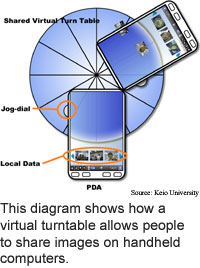
Virtual turntable simplifies
sharing
The lazy Susan -- a platter that turns,
making everything it holds accessible to anyone in any position around
the platter -- is an eminently practical interface.
Researchers from Keio University in Japan have tapped the concept
with an information-sharing scheme for mobile device users that evokes
the simplicity and utility of a lazy Susan.
The software, dubbed DataJockey, allows people using devices such
as photo-enabled cell phones to pass copies of digital images, messages,
songs and documents to nearby devices by dragging copies of the objects
to a virtual lazy Susan and turning a dial on the side of the mobile device.
On a handheld device, objects appear at the bottom of the screen.
Users can put them on the virtual platter by dragging them to the upper
portion of the screen. When one user moves the platter it moves across
all connected handheld screens. Users download objects by dragging them
from the top of the screen to the bottom.
The interface makes sharing digital information in a face-to-face
situation easier so people can concentrate on communicating with each
other, according to the researchers.
The virtual lazy Susan software runs on a server; hand-held devices
connect to the server via bluetooth short-range wireless communications
channels.
In the researchers' study, groups of users who shared snapshots
using the method easily understood the concept, and negotiations about
rotation of the virtual table occured naturally and without dispute, according
to the researchers.
The technique could be ready for commercial use within six months
to share information among existing cell phones that are equipped with
cameras, bluetooth, and global positioning system tracking devices, according
to the researchers. They presented the work at the User Interface Software
and Technology 2004 (UIST '04) conference held in Santa Fe, New Mexico
on October 24 to 27.
TRN's Top Picks:
Technology Research Advances of 2004
Letter to readers
Briefs:
Alcohol fuel cell goes micro
LED array turned into touch button
Coated nanotubes make biosensors
Gestures control true 3D display
Atom demo fixes quantum errors
Virtual turntable simplifies sharing
Molecular motor goes both ways
Solar cell teams plastic and carbon
DNA makes and breaks particle clumps
Sapphire steps shape nanotubes arrays

Research Watch blog
View from the High Ground Q&A
How It Works
RSS Feeds:
News
Ad links:
Buy an ad link
Ad links: Clear History
Buy an ad link
|
TRN
Newswire and Headline Feeds for Web sites
|
© Copyright Technology Research News, LLC 2000-2010. All rights reserved.